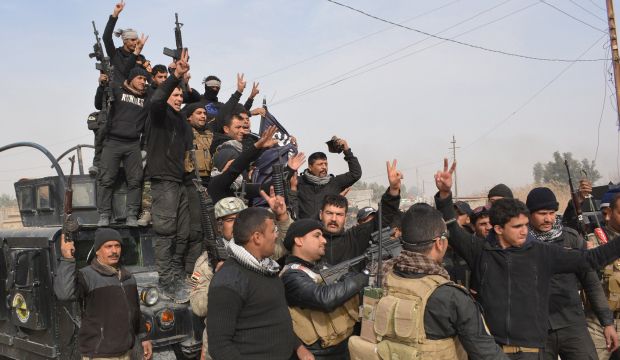
Iraqi government forces celebrate after they claimed they have gained complete control of the Diyala province, near the town of Muqdadiyah, on on January 26, 2015. (AFP Photo/Younis Al-Bayati)
Baghdad, Asharq Al-Awsat—At the same time that the Iraqi army has announced the liberation of Diyala province in the east of the country from the Islamic State of Iraq and Syria (ISIS), the region’s local tribes accused some of the Shi’ite volunteer forces who helped liberate the province of targeting Sunnis there.
In a press conference held in Diyala province on Sunday, Hadi Al-Ameri, who leads the Badr Organization, the armed wing of the Islamic Supreme Council of Iraq, a Shi’ite Islamist party involved in the fight alongside Iraqi troops, told reporters all populated areas in the province had been “completely liberated” from the presence of the extremist group.
“Our next meeting will be in Salah Al-Din province after we liberate Tikrit . . . and we will also liberate Kirkuk soon so long as we have these brave soldiers from the popular movements [Shi’ite volunteer groups] and the officers from the army,” Ameri said.
“I speak to the sons of the popular movements in particular in saying that our religious authorities insist on the importance of safeguarding people’s rights, money and property, without harming them in any way,” he added. Ameri also said he had received a message from Grand Ayatollah Ali Al-Sistani, the highest Shi’ite religious authority in Iraq, also stressing the importance of this issue, since it was a “religious and moral” one at heart.
However, on the same day, Iraqi Vice President Osama Al-Nujaifi said he had received numerous complaints from local tribal leaders in Diyala accusing members of the popular movements of burning down a number of Sunni mosques and raiding Sunni homes in the province.
A statement released by Nujaifi’s office said he had contacted both Prime Minister Haider Al-Abadi and Defense Minister Khaled Al-Obaidi requesting them to begin an investigation into the alleged abuses.
“Everyone is agreed that ISIS is an enemy that must be targeted and destroyed. But only on the condition that the fight against this terrorist group is not used as a pretext to commit crimes by those operating outside the law,” Nujaifi said in the release.
Karim Al-Nouri, a spokesman for the Badr Organization and its leader Ameri, told Asharq Al-Awsat he was skeptical about the accusations.
“It is unusual that the security forces and volunteers from the popular movements who were among those who carried out the operations to liberate Diyala are being accused [of these crimes], while ISIS, which actually carried them out, is not being accused of anything,” he said.
“Everyone in Diyala province knows fighters from ISIS use mosques and homes as hideouts and eventually blow them up when they know they are being surrounded,” he said. “Bearing in mind that we were involved in battles with the group in Diyala from street to street and home to home, and that most of those we lost in the fight were killed due to explosive devices and booby traps,” he continued.
“So whoever is making these accusations either doesn’t know ISIS or is trying to cover up for them in one way or another. And I must add that we are totally against any individual actions of this kind.”
Nouri said the next step in Diyala would be to return the people driven from their homes by ISIS back to the province.
Mazen Al-Khayzuran, a local tribal chief from Diyala, told Asharq Al-Awsat that these refugees represented the main issue the authorities now had to deal with in the province.
“There are whole areas in Diyala that have been emptied of people, all of whom are Sunni. We will now try to return them to their homes as officials have promised they will,” he said.
“The suffering of the people of Diyala is great at this time because it has become impossible to know who is a friend and who is an enemy, so we are now basically between a rock and hard place to the extent that we are beginning to feel there is even coordination between ISIS and the different volunteer militias to disrupt the social makeup in the province, which is host to people of different ethnic and sectarian backgrounds and who have for the past period been living together in harmony,” he told Asharq Al-Awsat.
Speaking to Asharq Al-Awsat, Turath Mahmoud, the media representative for the Diyala provincial council blamed the policies of Nuri Al-Maliki for the current situation in the province, accusing the former premier of discriminating against the Sunni civilian forces who volunteered to “first fight Al-Qaeda and then ISIS, with their eventual fate being death, displacement or imprisonment” from the Maliki government.
“ISIS played on all this and used it to get into many areas in the province. But the people eventually found out the truth about who they really are and are now ready to cooperate with the Iraqi forces to fight against them. But there are others who do not want this and even carry out dangerous acts including burning mosques and then saying it was ISIS that did it, thereby shielding us from the truth,” he said.
